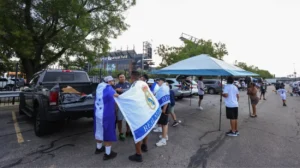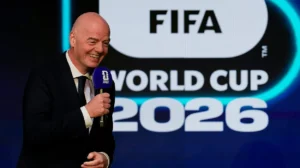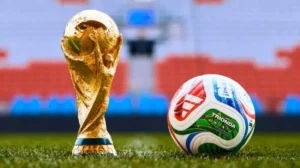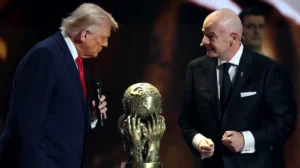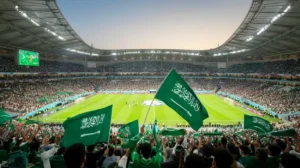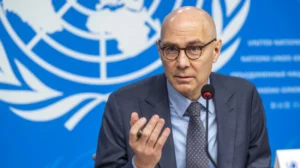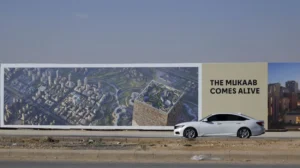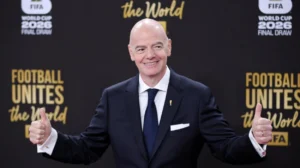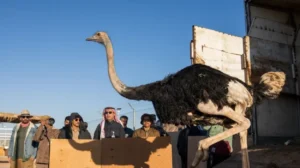- Home
- Why Boycott?
- Human Rights Violations
- Migrant Workers Exploitation & Kafala System Abuse
- Saudi Arabia’s War Crimes
- Freedom of Press and media censorship
- Torture And Unfair Trials
- Saudi Arabia’s Anti-Climate Agenda
- Bogus Stadium Infrastructure
- Sportwashing & Political image
- Saudi Arabia’s Unfair bidding Process
- FIFIA Corruption and Transparency issues
- Poor Treatment of LGBTQ community
- Security risks for spectators
- News
- Get Involved
- Contact Us
Saudi 2034 FIFA Worldcup News
As global concern rises over human rights abuses, government censorship, and FIFA’s integrity, the 2034 World Cup in Saudi Arabia has become one of the most contentious sporting events in history. This page brings you the latest news, developments, and critical analysis surrounding Saudi Arabia’s controversial hosting of the FIFA World Cup in 2034.
A World Cup Built on Secrecy and Controversy
When FIFA awarded the 2034 World Cup to Saudi Arabia in late 2023, it did so without an open bidding process. Within hours of the bidding window opening, all other potential hosts were sidelined. This rapid endorsement sparked international outrage, with transparency watchdogs, human rights organizations, and former athletes questioning FIFA’s motives. Critics argue that the move betrays FIFA’s own Human Rights Policy, which states that hosting rights must be awarded in a fair, transparent, and inclusive manner.
Since the announcement, investigative reporting and global media outlets have uncovered layers of diplomatic pressure, closed-door lobbying, and what many call a modern form of “sportswashing” — using mega-events to sanitize the image of an authoritarian regime.
The Human Cost of a Saudi World Cup
Saudi Arabia’s human rights record continues to draw widespread condemnation. From the execution of political dissidents and the persecution of LGBTQ+ individuals to restrictions on women’s freedoms and press censorship, the reality on the ground raises urgent questions about the safety of players, fans, and journalists attending the 2034 tournament.
In 2023 alone, more than 100 people were executed in the kingdom, many after unfair trials. Women’s rights activists like Loujain al-Hathloul remain gagged or in exile, and homosexuality is still punishable by imprisonment, corporal punishment, or even death. Despite international criticism, Saudi authorities have shown no willingness to reform — all while investing billions in sports infrastructure, clubs, and events.
International Backlash: The Boycott Movement Grows
Since the FIFA announcement, momentum behind the #BoycottSaudi2034 movement has only grown stronger. Prominent voices such as Amnesty International, Human Rights Watch, and even football legends like Gary Neville have spoken out against Saudi Arabia’s suitability as a host. In March 2024, the hashtag trended globally on social media, with over 10 million engagements within a single week.
National football federations in Scandinavia, parts of Europe, and Latin America are now facing increasing pressure from civil society to reject participation unless FIFA addresses the mounting concerns. Global fans are calling for sponsors and broadcasters to pull out, demanding accountability and reform.
FIFA Faces Renewed Scrutiny Over Corruption and Ethics
The Saudi World Cup decision has reignited scrutiny on FIFA’s governance, with critics pointing to a long history of corruption, backroom deals, and political compromises. Despite FIFA’s 2017 adoption of a formal Human Rights Policy, its track record shows a pattern of prioritizing profits and power over principles.
By awarding the 2034 tournament to Saudi Arabia — a nation with no functioning freedom of press, no democratic institutions, and a record of silencing dissent — FIFA has undermined its credibility. Transparency International, FairSquare, and other anti-corruption watchdogs have urged independent investigations into the bidding process and called for greater public oversight.
Stadiums, Construction, and Migrant Labor Concerns
Another key issue dominating Saudi 2034 news coverage is the treatment of migrant workers involved in constructing World Cup infrastructure. Drawing from the lessons of Qatar 2022 — where thousands of workers faced abuse, exploitation, and even death — human rights groups are already monitoring Saudi labor practices closely.
Saudi Arabia has announced plans for futuristic cities and smart stadiums, many located in the $500 billion NEOM megaproject. But who will build them? How will laborers be treated? What protections will be in place? These questions remain largely unanswered, and early reports suggest a continued reliance on exploitative labor systems similar to the kafala model.
LGBTQ+ Rights and Cultural Repression: A Dangerous Climate for Fans
For many LGBTQ+ football fans, the idea of attending a World Cup in Saudi Arabia is not only unwelcoming — it’s dangerous. Same-sex relationships are illegal, punishable by harsh sentences, and queer identity is criminalized. While Saudi officials have vaguely promised “respectful hospitality,” they have not outlined any legal or social guarantees for visiting fans from diverse backgrounds.
During Qatar 2022, rainbow flags were banned, and public displays of affection were discouraged. In Saudi Arabia, the penalties are even harsher, and there is no indication that exceptions will be made for the World Cup. International Pride organizations have condemned FIFA for ignoring these risks and for failing to stand by its commitment to inclusivity.
Media Censorship and the Threat to Free Press Coverage
Freedom of the press is virtually nonexistent in Saudi Arabia. Journalists must operate within strict government controls, and criticism of the royal family or religious authorities is punishable by law. The murder of journalist Jamal Khashoggi in 2018 — a state-sponsored killing, according to UN and CIA reports — remains an open wound in the international media community.
With such a hostile environment for journalism, how will independent reporting be handled during the 2034 World Cup? Will foreign reporters be censored, monitored, or detained? Media watchdogs have warned that the very act of covering the tournament in Saudi Arabia could expose journalists to serious legal and physical threats.
FIFA’s Double Standards: The Hypocrisy of “Unity” Rhetoric
FIFA frequently promotes the World Cup as a celebration of global unity, inclusion, and respect. But in choosing Saudi Arabia as host, these principles ring hollow. In countries where dissent is punished, diversity is outlawed, and transparency is avoided, the very soul of the tournament — joy, community, and freedom — is at risk.
This glaring contradiction is not lost on fans, players, or activists. The call to boycott is not just about one country. It’s about preserving the integrity of the sport, and about resisting the normalization of authoritarianism through spectacle.
What Comes Next: Resistance and Accountability
Despite the challenges, the global response to Saudi 2034 has shown that civil society is paying attention. Petitions, open letters, and grassroots campaigns are growing by the day. Athletes, journalists, artists, and human rights defenders are demanding that FIFA reverse its decision or introduce strict conditional reforms before the tournament moves forward.
Meanwhile, the Saudi regime continues to pour billions into sports — from Formula 1 and LIV Golf to esports and football clubs like Newcastle United. But the world is no longer easily distracted. Each new investment is now accompanied by scrutiny, protest, and resistance.
Stay Informed, Stay Engaged
Saudi 2034 FIFA World Cup News will continue to provide updates, verified reports, and expert commentary as the situation evolves. We invite you to follow the news, share it widely, and be part of a growing global movement to protect the soul of football from authoritarian capture.
Whether you’re a football fan, a journalist, or a concerned global citizen — the future of the beautiful game is in your hands.

